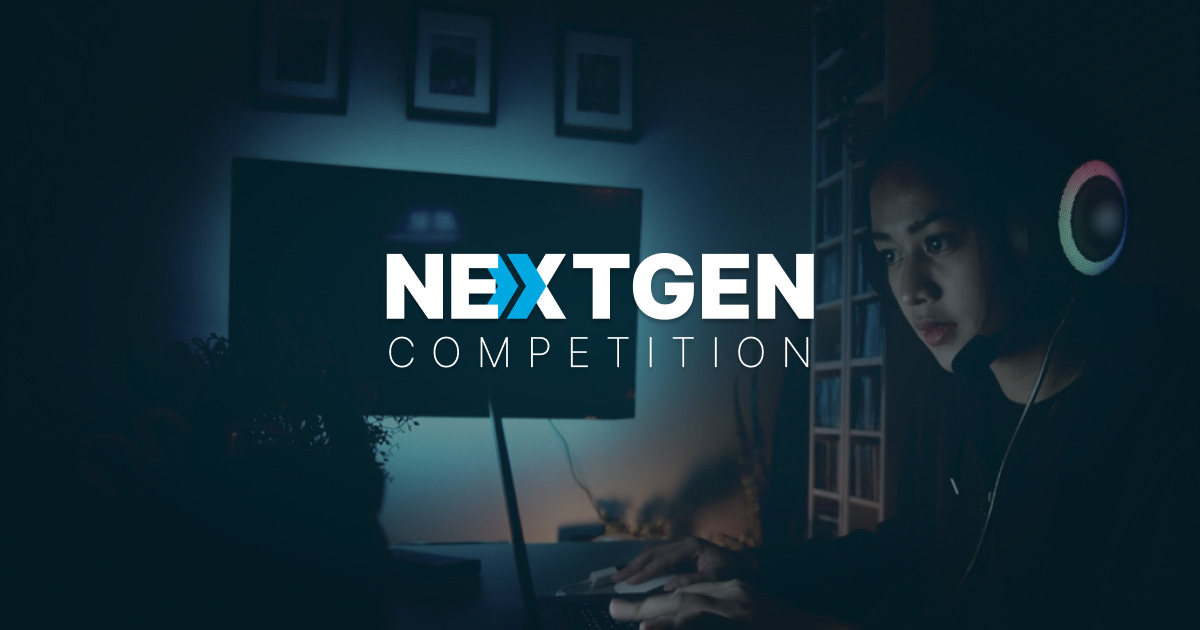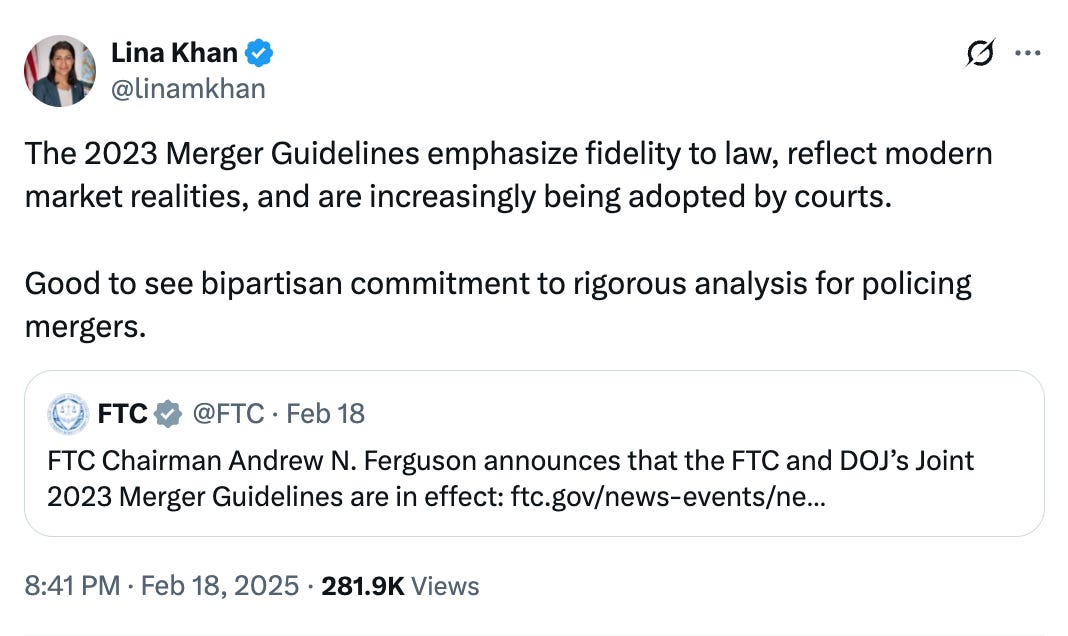Top Hat & Thimble - February 2025
Welcome to NextGen Competition’s newsletter, delivering insider insights on antitrust battles, industry shakeups, AI trends, and more.
Amid the chaos and rancor of the first few weeks of President Trump’s second term, one signal is clear: the unchecked monopoly power of Big Tech will continue to face serious scrutiny.
Despite Big Tech oligarchs paying fealty at January’s inaugural events, the administration has made a series of notable antitrust appointments. President Trump named Andrew Ferguson as Chair of the FTC, nominated Mark Meador as an FTC Commissioner, and tapped Gail Slater to lead the Antitrust Division at the DOJ—an antitrust trifecta, if they are allowed to do their jobs.
While Ferguson is unlikely to follow Lina Khan’s exact approach, his stance is clear: he has pledged to “end Big Tech’s vendetta against competition”—his words, not ours. Meador’s public comments suggest he was nominated with a similar mission in mind, and Slater, a veteran in antitrust law, is expected to maintain the DOJ’s aggressive enforcement against tech monopolies.
Together, this trio will shape the next phase of antitrust enforcement—scrutinizing mergers more closely, challenging anticompetitive conduct, and possibly reviving structural breakups as a serious policy option. Their effectiveness will depend on whether they can withstand industry pressure, political headwinds and a President known for changing his mind and willingness to sell us all short just to make a deal. While Big Tech firms are already mobilizing lobbyists to weaken enforcement efforts, the administration appears to be putting together a strong team to fight the status quo in the tech industry.
Speaking of the status quo—stay tuned for a leadership transition at NextGen Competition. After more than two years at the helm, I will be stepping down as Executive Director. However, I’m not going far—I’ll be joining the Board of Directors and continuing the fight for fair and open markets.
More updates soon. Stay engaged, and as always, thank you for your support.
Sincerely,
George Rakis
Executive Director
NextGen Competition
DeepSeek’s Rise Blows Up Big Tech’s Monopoly Myth
Big Tech has spent years pushing the false narrative that antitrust enforcement would give China an edge. But DeepSeek’s rapid ascent shows that China’s AI advancements are happening regardless. Perhaps if Big Tech hadn’t spent so much time in Washington protecting its monopoly status, it would have noticed that China was fast on its heels.
NextGen Competition’s latest research note focuses on the news that blows a gigantic hole through a Big Tech myth that Alphabet, Amazon, and Microsoft have been pushing in policy circles for years. DeepSeek’s meteoric rise shatters Big Tech's entire justification for its antitrust arguments.
So what’s the answer? We can’t back down from strong antitrust safeguards. We need competition and we need to ensure startups have a chance to compete with Big Tech. Otherwise, we’ll be left in the dust as China races to the finish line.
Cautiously Optimistic About Mark Meador
This week, the FTC nominee technically set to replace Lina Khan had his first confirmation hearing on Capitol Hill. While he said many of the right things, there’s another reason to have hope that Khan’s tenure will have lasting influence.
Khan and Jonathan Kanter’s legacy of antitrust enforcement has staying power because of the courts and the 2023 Merger Guidelines. This month, FTC Chair Andrew Ferguson announced he would keep Khan and Kanter’s signature merger guidelines. That’s big.
Plus, as The American Prospect’s executive editor argued in December, “the fact that judges have moved in Khan and Kanter’s direction suggests a revival of long-dormant laws restraining the power of corporations to dominate American life.” One doesn’t have to look much further than the $25 billion merger between Kroger and Albertsons, which a U.S. district court judge in Oregon ruled should be blocked.
If we take Meador at his word, he seems poised to be a stronger voice on antitrust than his fellow commissioners, Ferguson and Melissa Holyoak. But unlike the Biden administration, which largely entrusted management of these agencies to its appointees, Trump is expected to have a far heavier hand. In fact, Trump and Ferguson already agree that the FTC shouldn’t be independent… 😵💫
Will the FTC be weaponized against Trump’s enemies in the same way the Federal Communications Commission has been? Only time will tell. Until then, we remain hopeful that competition can remain a bipartisan issue.
Other Competition News
Headlines from the past month you might have missed:
Lina Gets the Last Word: Not long after her departure as FTC Chair, Lina Khan penned an important New York Times op-ed, appropriately titled, “Stop Worshipping the American Tech Giants.” In Lina style, she makes a seamless argument against backing off Big Tech, highlighting why antitrust actions are crucial in reining in monopolies and allowing smaller companies to thrive.
We especially enjoyed this part:
While monopolies may offer periodic advances, breakthrough innovations have historically come from disruptive outsiders, in part because huge behemoths rarely want to advance technologies that could displace or cannibalize their own businesses. Mired in red tape and bureaucratic inertia, those companies usually aren’t set up to deliver the seismic efficiencies that hungry start-ups can generate.
In Common Dreams, Congresswoman Jan Schakowsky praised the FTC under Lina Khan’s leadership, highlighting the agency’s “commitment to battling corporate greed and protecting consumers,” emphasizing that their work “should serve as an inspiring example to the new administration.”
Lastly on the Lina front, in an appearance on MSNBC last week, she talked monopolists, antitrust laws, and this amazing line, which really boils it down: “If you allow unchecked concentrations of economic power, that undermines people’s liberties in a really fundamental way.” 🔥
A stark warning: Much has been written over the last six weeks on the intimacy between Big Tech CEOs and the current administration, and everyone should be concerned when corporate and government power are too cozy. Take it from those who have lived through close ties between tech companies and dictatorships: the result isn’t pretty. In a Washington Post op-ed, Vladimir Kara-Murza, Yulia Navalnaya, and Ilya Yashin highlight the concessions tech companies are willing to make to curry favor with dictatorships:
Block access to foreign media? Done. Restrict tools that bypass censorship? No problem. Deny citizens tools to encrypt their messages to avoid repression? Even to that, Big Tech says “yes.”
Sound familiar? 🤔 Their op-ed outlines principles companies can pursue that prioritize human rights, assess the actual impact of local laws, and facilitate dialogue among consumers.
Big Tech’s trickle-down effects: From mass layoffs to immigration to the impact of data centers on farmers, Big Tech’s monopolist, profit-first policies are having a devastating toll on the daily lives of everyday Americans. Mya Frazier, an investigative journalist in Ohio, remarked about the data centers:
Well, we’ve seen a massive increase in the price of farmland, which has made farming unsustainable for families who have farmed for generations around this area. We’ve also seen very little public benefit to the development of these data centers in the area. The deals that have been made have all been negotiated by Jobs Ohio, which is the privatized arm of economic development in Ohio, and I think that’s left a lot of local people feeling like they are powerless before this massive expansion of big tech infrastructure in Middle America.
Losing faith: A recently released study from Common Sense Media surveyed over 1,000 American teens, finding a staggering loss of trust in Big Tech, with TechCrunch reporting that “64% of surveyed U.S. teens don’t trust Big Tech companies to care about their mental health and well-being and 62% don’t think the companies will protect their safety if it hurts profits.” Ouch. 🤕
To add to that, The Hill reports that the Edelman Trust Barometer recently found that only 32% of U.S. adults trust AI, with trust in Big Tech “to do what is right” falling 10 points over the last ten years from 73% to 63%. 😳
To make matters worse, federal employees have entered, or more accurately, left the chat, with The Verge reporting that Big Tech flattery has led to a mass migration of federal workers from apps like Facebook to more secure communication mediums like Signal: “what was once skepticism has grown into deep distrust — not just of their boss’s boss’s boss, but of the very services they use to communicate with one another, worried that their messages will be leaked to the government.” If these reports are any indication, Big Tech has some serious work to do regarding reputation management.
Slater the Scalpel: Gail Slater, the President’s nominee for Assistant Attorney General for the DOJ’s Antitrust Division, was on the Hill this month, leaving Big Tech critics cautiously optimistic she’ll be a force for good in reining in Big Tech.
One thing’s for sure: her approach will differ from her predecessor’s. In her hearing, she argued for a “scalpel” rather than a “sledgehammer” method for taking on tech giants, more of a precision-focused, rather than a panoramic-centric approach to antitrust legislation.
One question we also were curious about was brought up during the hearing. Would she continue the pending cases against tech giants like Google and Apple?
“Resources are, of course, a very important consideration in antitrust litigation, in taking cases further. It's very complex civil litigation, as you know, and costly,” she said. “So that will be an absolute intention to, once I get there, reading to all of the open litigations that are in the docket.”
Hm, color us still skeptical. 🤨
Over in Europe, the fight over tech regulations is heating up. 🔥 Omer Kabir of CTech reports:
In recent weeks, tech giants have launched a lobbying campaign against the European Union's technology regulations in an attempt to dilute them and make implementation easier. The trigger for this effort is the stance taken by President Donald Trump's administration against the EU's strict regulation of American technology companies, as well as the companies’ hope of gaining support from the White House. The move is likely to lead to a clash between the U.S. and the EU, in what could be described as a regulatory war.
This comes on the heels of Vice President J.D. Vance’s speech at the AI Action Summit in Paris, which the Financial Times called a “lash out at the EU’s legislation on tech by denouncing the bloc’s “onerous international” rules.”
Europe isn’t daunted, though. Henna Virkkunen, the EU’s tech leader, said Europe was “fully committed to enforce our rules”, despite US pressure. Likewise, Teresa Ribera, the EU’s antitrust leader, confirmed that decisions on the ongoing cases against Meta and Apple would be released next month as planned.
FYI, if you’re interested in statements made on the EU’s tech regulations, Tech Policy Press is tracking them here. 📋
Lastly, much has been written about Big Tech’s rightward shift (including our own blog last month), but Vox is out with an interesting piece that breaks down this shift, highlighting reasons such as changing economic conditions, policies of the Biden administration, and a shift in how Democrats perceived Big Tech. It’s worth a read.
Until next month! In the meantime, follow us on X and BlueSky for the latest on Big Tech, AI, and antitrust.



